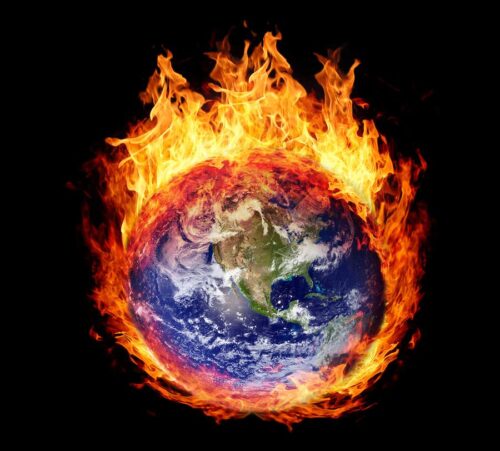By Carl Conetta, 21 Dec 2015

The current [2015] war hysterics began years ago, 2011 – soon after Congress turned to cap discretionary spending. Successive Pentagon leaders began warning that rolling back the DoD budget to the level of 2008 or 2009 (inflation adjusted) would have devastating, even catastrophic effects on the US military. It would make America weaker and inhibit our ability to respond to threats (SecDef Hagel), hasten instability in Asia and put “the nation at greater risk of coercion” (JCS Chair Gen. Dempsey), and even invite aggression (SecDef Panetta). Various leaders, democratic and republican, began seeing Hitler reincarnated in the form of Putin, Assad, or both. In ISIS they saw an apocalyptic threat “unlike anything we’ve seen” (Hagel). And many worried aloud about a new American isolationism. (For sources, see A Short Tour of Pentagon Hysterics.)
From every direction, the warnings came. Director of National Intelligence James Clapper: “In almost 50 years in intelligence, I don’t remember when we’ve had a more diverse array of threats and crisis situations around the world to deal with.” Others concurred: The global security environment is “more dangerous than it has ever been” (Gen. Dempsey, Chairman, Joint Chiefs), it’s “the most uncertain I’ve seen in my thirty-six years of service” (Gen. Odierno, Army Chief of Staff), there’s “greater turmoil than at any time in my lifetime” (Sen. John McCain).
No wonder Americans are worried. Well, ISIS is real enough as is the Syrian civil war, Russian actions in Ukraine, and Chinese assertiveness in the South China Seas. But are they exceptional and indicative of a world gone wild? (Here, I argue that what’s exceptional today are domestic partisan political dynamics.)
The crises represented today as unprecedented are anything but. The emergence and spread of ISIS and Boko Haram, for instance, recall the Taliban both in Afghanistan and Pakistan. It also recalls the Iraqi insurgency and communal slaughter of 2004-2009. And the rise of Hamas and Hezbollah (1985). The foreign fighter phenomenon is not new, nor is the practice of militant groups seeking to affiliate with their more successful analogs. It’s true that ISIS uniquely stages its atrocities for maximum media exposure. But this does not make them qualitatively more threatening then were their Iraqi precursors (both Sunni and Shia) or the Taliban or Al Qaeda (which, after all, struck hard at America several times). The terrorist attacks in Paris were horrific, but they mirror attacks in Europe during the 2000’s: the 2005 London bombing and the 2004 Madrid train bombing (which together claimed 243 lives and injured 2,750).
Perspective is also due in weighing the Syrian civil war, the wars in Sub-Saharan Africa, and recent Russian and Chinese behavior. The Syrian conflict replays Iraq, Afghanistan, Algeria (1992-99), Chechnya (1991-2009), Lebanon (1975-90), Somalia (1988-present), Sri Lanka (1983-2009), Sudan (2003-09), Tajikistan (1992-96), the former Yugoslavia (1992-1999), and Yemen (1994-present). Today’s civil wars in East, West, and Central Africa recall the much worse conflicts of the 1990s and 2000s. Overall, conflict deaths are down from the 1965-1998 period. And, although conflict deaths have jagged somewhat upwards in recent years, this is mostly due to conflict in one place: Syria
Recent Russian and Chinese actions of concern also have their near equivalents in the not distant past: Russia in Georgia (2008), China and the 2012 Scarborough Shoal standoff, and recurrent Taiwan Straits crises. The rise (or resurgence) of Russia and China are not new. They’ve been underway for 17 years.
Any argument for the especially dire state of the world today must also take into account the cyclical crises involving North Korea, India-Pakistan, and Israel that dot the past 20 years. Of course, none of today’s interstate wars compare with those of the 1980s.
Two concluding points: 1. The 1990-2010 period of US unipolar dominance is now ending, as it was bound to end; it was exceptional. This is hard for official Washington to countenance. 2. While hawks and the defense establishment always argue that US restraint leads to global instability, they are blind to the possibility that US military activism contributes to instability that reverberates for years to come. In fact, we are today living in the backwash of our post-9/11 wars.
